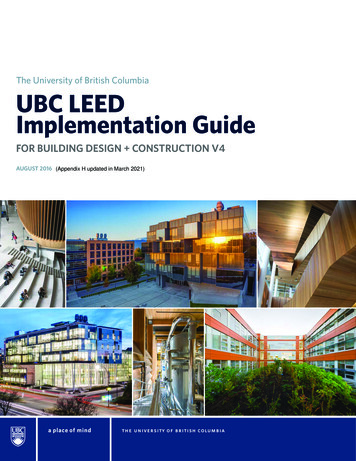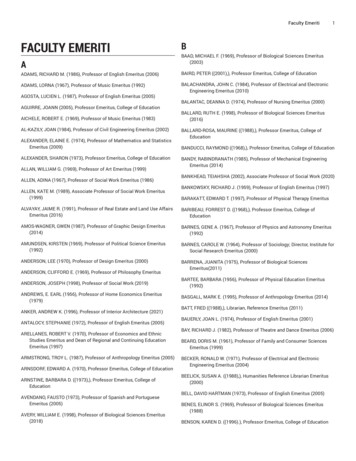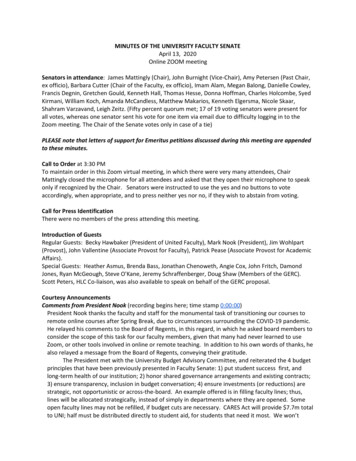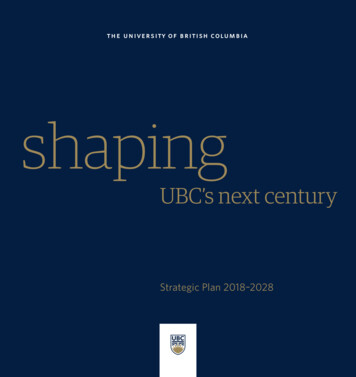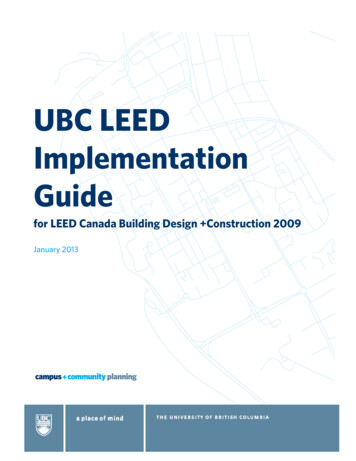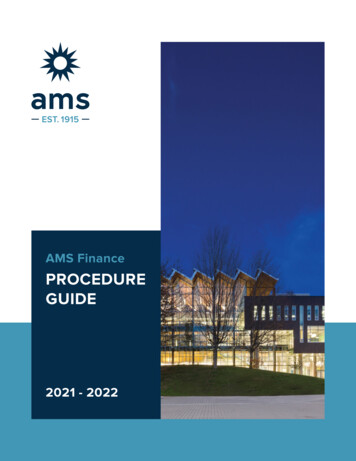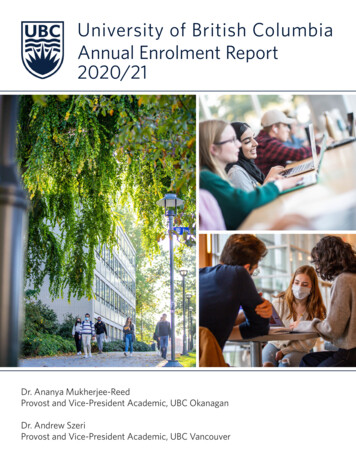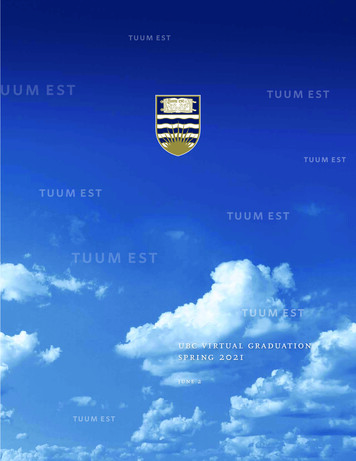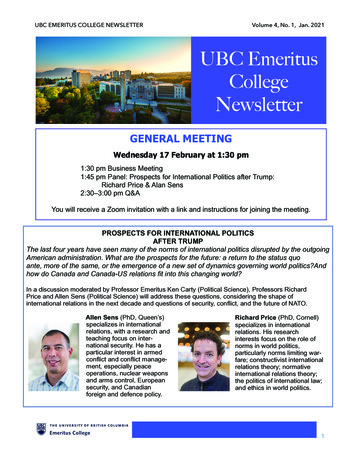
Transcription
UBC EMERITUS COLLEGE NEWSLETTERVolume 4, No. 1, Jan. 2021UBC EmeritusCollegeNewsletterGENERAL MEETINGWednesday 17 February at 1:30 pm1:30 pm Business Meeting1:45 pm Panel: Prospects for International Politics after Trump:Richard Price & Alan Sens2:30–3:00 pm Q&AYou will receive a Zoom invitation with a link and instructions for joining the meeting.PROSPECTS FOR INTERNATIONAL POLITICSAFTER TRUMPThe last four years have seen many of the norms of international politics disrupted by the outgoingAmerican administration. What are the prospects for the future: a return to the status quoante, more of the same, or the emergence of a new set of dynamics governing world politics?Andhow do Canada and Canada-US relations fit into this changing world?In a discussion moderated by Professor Emeritus Ken Carty (Political Science), Professors RichardPrice and Allen Sens (Political Science) will address these questions, considering the shape ofinternational relations in the next decade and questions of security, conflict, and the future of NATO.Allen Sens (PhD, Queen’s)specializes in internationalrelations, with a research andteaching focus on international security. He has aparticular interest in armedconflict and conflict management, especially peaceoperations, nuclear weaponsand arms control, Europeansecurity, and Canadianforeign and defence policy.Richard Price (PhD, Cornell)specializes in internationalrelations. His researchinterests focus on the role ofnorms in world politics,particularly norms limiting warfare; constructivist internationalrelations theory; normativeinternational relations theory;the politics of international law;and ethics in world politics.1
UBC EMERITUS COLLEGE NEWSLETTERVolume 4, No. 1, Jan. 2021CONTENTSpageContributions to theNewsletterPlease send the editorinformation about your recentactivities and communityengagements. Suggestions forstories are welcome. Spacepermitting, we will listpublications in the newsletter inthe citation format of yourchoice. For awards, adescription of the award, awardcitation, or link to theannouncement is helpful. Wemay edit submissions for brevityor clarity. Photographs suitablefor publication are alwayswelcome.Thanks to Don Blake fordesigning the front page andmuch more, and Carolyn Gilbertand Herbert Rosengarten fortheir advice and keen eyes fortypos, errors and font sizechanges. All errors and bizarrelayout features are the ��–––The Emeritus College (formerlyUBCAPE) could not functionwithout the contribution of manypast Presidents/Principals andMembers-at-Large whocontinue to provide theirservices.College NewsPrincipal's ReportFrom the College34–11New MembersAwardsEmeritus NewsIn MemoriamPublicationsCovid StudyAround Campus12–1314–1920–222324-252627-29UBC Emeritus College OfficeSandra van Ark manager@emerituscollege.ubc.caChristina Girardi. office@emerituscollege.ubc.caOffice address:Room 110, Ponderosa Annex F2008 Lower Mall, Vancouver, BC, V6T witter:@UBCemeritiCollege Council 2020-21Principal Graeme WynnVice-Principal Joost BlomPast Principal Donald FisherMembers-at-LargeGail BellwardSandra BresslerMargery FeeAnne JunkerLinda LeonardMichael MacEnteeHerbert RosengartenRichard UngerMarvin WestwoodNewsletter EditorMargery y.fee@ubc.ca2
UBC EMERITUS COLLEGE NEWSLETTERVolume 4, No. 1, Jan. 2021Principal’s ReportWriting this report as the long tunnel of the 2020 pandemic fades into the rearview mirror and thenew year brings prospects of several more months of COVID-induced restrictions andanxieties, I am brought to ask where the UBC Emeritus College stands in January 2021, and tocontemplate the roles that it might play going forward.These are troubling times. The coronavirus dominatesmany news channels. There is a morbid fascination withnumbers: of cases, hospitalizations, deaths, vaccines “in arms.”Understandably. The danger of COVID-19 is real and present,even if the data logging its presence are foggy, and both theyand details about vaccination programmes are veiled by politicalconsiderations. Still, outstanding scientific work, coupled with awidespread sense of impending doom in this (pandemicinduced) time of gloom and Zoom -- that has drivengovernments and large numbers of citizens to decisive actions-- promises some relief from the pandemic scourge (at a dateyet to be determined).On other fronts, from climate change to the future ofdemocracy, paths to resolution are less clear. As the January12 Emeritus College Conversation on Climate Changerevealed, outstanding science and high public anxiety do notalways or easily come together to produce solutions. We knowthe nature of the climate problem, and the risks it entails, but neither behavioural change norscientific intervention can hope to “vaccinate” the world against its consequences fordecades to come. The best we can mount is a holding action––and one that will demand fargreater sacrifices than wearing masks, washing hands, and staying apart. Death and(carbon) taxes may be unavoidable, but prospects of the former concentrate minds andproduce interventions far more decisively than the latter.Meanwhile the assault on the US Capitol on January 6th has roiled our neighbours tothe south and stirred concern worldwide. Whether the events of that day are properly termedan insurrection, a race riot, or a sorry manifestation of crumbling democratic institutionsremains to be seen, but placed on a world stage they serve as a troubling reminder of thestate democracy is in. Millions of South Africans have soured on the promise of their 1994constitution and consider their democracy compromised or “empty.” Populist, autocratic,nationalist politicians elsewhere have subverted democratic ideals, placed burrs underideological and group saddles and nurtured anger and division. The growing contempt forcivil society, civic unity, and the ties that bind people together is troubling.Unfortunately, the UBC Emeritus College cannot alone arrest the pandemic, addressthe climate crisis, or solve the world’s political problems. But we can remember our rootsdeep in communities committed to the pursuit of knowledge and recognize that by comingtogether to work for the larger good of our membership and our community, we can fosterthe sharing of ideas and friendships that is so integral to developing effective colleges andsocieties. Please read deeper in this newsletter to discover how you can help the cause.Graeme Wynn, Professor Emeritus, Geography3
UBC EMERITUS COLLEGE NEWSLETTERVolume 4, No. 1, Jan. 2021From the CollegeNEW STRUCTURE –– NEW OPPORTUNITIESGraeme WynnIt is important to the long-term vitality of the Emeritus College that we continue to offerour diverse membership a range of interesting programs and activities and that weencourage as many people as possible to benefit from what the College offers.As a first step in this direction the College Executive and Council spent the falldesigning, discussing, and approving a new operational, or governance structure forthe Emeritus College, discussed in the previous newsletter and now depictedschematically below. In sum, this new model (approved by the College Council inDecember) retains the Executive and Council (assisted by the office staff) at theadministrative core of College operations, even as it seeks to cluster and establishhigher levels of autonomy and participation / engagement in the important range ofactivities and services the College provides for its members.All co-ordinator, convener and committee chair appointments will run on an annualbasis, with initial appointments for one or two years, generally renewable. This meansthat new program conveners will be appointed as soon as possible, with responsibilityfor scheduling activities beginning in September (2021) and running through April(2022).The Emeritus College is a volunteer-driven organization, and its strength andvigorous continuation depend on broad participation.Our transition from the UBC Association of Professors Emeriti to the Emeritus Collegein 2019 has been a significant step in our evolution. We are better supported by theUniversity, but we also have an expanded and demanding agenda. I hope that you willhelp us become the model we aspire to be as the first and still only emeritus college inCanada. We stand poised to make a difference for emeritus colleagues nationally, andtrust you will be part of that.I do hope that you will find the time and inclination to contribute to this importantenterprise.Expression of interest, and queries regarding further information can be directed to me,(wynn@geog.ubc.ca).4
UBC EMERITUS COLLEGE NEWSLETTERVolume 4, No. 1, Jan. 2021The UBC Emeritus College: Structure and Governance ModelWe look to our membership – emeritus colleagues – to introduce new ideas, newenergy, and new enthusiasm into the activities of the College.Please be encouraged to step forward, in whatever capacity you feel you would like tocontribute. Further, should you know of other Emeritus colleagues who might serveeffectively in a particular way, please don’t hesitate to suggest their names, and aword about what they might contribute, to me or the office staff.Here, as we enter 2021, is an outline of the new opportunities associated with the newstructure of the Emeritus College diagrammed below.GeneralMeetingsProgramsCLUSTERAd hoc talksdActivitiesCLUSTERCouncilResearch eServices forProspectiveand CurrentMembers ofthe EmeritusCollegeSI groups areopen to allEmeritusCollegemembers &their partnerslisheSenior ences:Colleagues(retired ningais LiaisoRdtnnueFmowEndStaffMetricsChairNewsletter EditorEditorial BoardMetrics-CommnManagerAssistantRetirement Matters CLUSTERTransitions to Retirement Committee Membership Committee Benefits CommitteeUnit RepsAwards CommitteeScholarly ExpensesSubsidy CommitteeContinuing Scholarly Activity &Engagement Committee.5
UBC EMERITUS COLLEGE NEWSLETTERVolume 4, No. 1, Jan. 2021The UBC Emeritus College: Structure and Governance Model, cont’dThree CLUSTERS - one co-ordinator or two co-ordinators for eachRETIREMENT MATTERS: This cluster deals with fundamental services provided by theCollege, from Transitions to Retirement Programs, to monitoring and improving benefitsprograms, and a range of other important matters, from the adjudication of College awards,the disbursement of financial subsidies for scholarly activity, and the identification and initialdevelopment of initiatives (in the manner of a “think-tank”) to enhance the value of theCollege to its members, the university, and society. Each of these services is overseen by acommittee comprised of members of the College and there is scope for severalappointments as a committee member or committee chair. Important work is done by thesecommittees — in a supportive and enjoyable environment — for the benefit of all Emeriti.PROGRAMS: The College offers a variety of programs for varied audiences (colleagues,retired or otherwise, and the public at large). Most of these are well established, thoughthere is room for innovation and there will be some evolution as we transition from COVID topost-COVID operating protocols. We need convenors (who will serve initially for one or twoyears – and who may invite colleagues to assist them) for each of the following programs:Senior Scholars’ Series — talks in current interview format, as in-person lectures atGreen College, or as hybrid events. Three per term; total six. Convener identifies andschedules speakers in conjunction with Green College.Emeritus College Conversations — developed for the Zoom-world of COVID.Three emeritus speakers and a moderator. Convener identifies topics, recruits speakers andschedules conversations in conjunction with College Office. Number per annum is flexible.General Meetings — Four or five per year. Programming can vary, from singlespeaker to group performances. To be decided by convener in conjunction with Cluster coordinator and Emeritus College Office.Philosophers’ Cafe — held at Tapestry in pre-Covid times; open forum fordiscussion of a specified topic. Could be transitioned to Zoom or similar platform. Conveneridentifies topic and scheduling.Emeritus Research Day — in abeyance during COVID-19. Previously held as a(half-) day event at PWIAS, with 3 to 5 emeriti presenting their ongoing research. Formatopen to adjustment. Convener identifies speakers, schedules with help of the College Officestaff, and chairs the event.Ad hoc Lectures — scope for innovation or collaboration with Retirement MattersCluster Committees or others to mount one or two, or a short series, of talks. Convenor hasconsiderable flexibility. To date these have included lectures under the rubrics “My Health,My Responsibility,” “Occasional Lectures by Emeriti,” and “Emeritus Philanthropic Work.”Each of these programs offers a fine and satisfying prospect to put a significant stamp onthe College’s offerings. The rewards far exceed the work involved.6
UBC EMERITUS COLLEGE NEWSLETTERVolume 4, No. 1, Jan. 2021The UBC Emeritus College: Structure and Governance Model, cont’dACTIVITIES: This is a loose cluster of Special Interest Groups. Groups and convenersare largely self-identifying and substantially autonomous. They meet on their ownschedule and on topics they decide. We currently have a handful of SIGs. Currentleaders: Photography (Derek Applegarth, with Richard Spencer providing technicalhelp); Travel (Paul Steinbok); Film (John LeBlanc); Poetic Odysseys (Philip Resnickand George McWhirter). Two more groups are primed to begin in 2021: Volunteerism(Nancy Gallini); Easy Riders— bicycling (Kay Teschke & Graeme Wynn).We are keen to establish additional groups. Possibilities are almost endless: Urbanexploration (walking); Hiking; Book club(s); Wine-tasting; Grand-parenting; Dining;Music Appreciation. If you have an interest or a passion that you would like to gettogether with others to share, please be in touch. We will do what we can to make setup straightforward and also assist in announcing meetings .We have also established a COMMUNICATIONS node to complement the Newsletterin improving internal and external communication. Please come forward if you haveinclinations to assist with publicity, social media, etc.Finally we have established a small Committee for Fund-Raising and EndowmentLiaison, that will link the College with the UBC Development Office in a spirit of mutualcollaboration. The chair of this committee will also sit on the College FinanceCommittee – if you have an interest in philanthropy, “Advancement” and financialaffairs please consider joining this new endeavour. Its work is important but notonerous.All co-ordinator convener and committee chair appointments will run on an annual basis.with initial appointments for one or two years, generally renewable. This means that newprogram conveners will be appointed as soon as possible, with responsibility for schedulingactivities beginning in September (2021) and running through April (2022).The Emeritus College is a volunteer-driven organization, and its strength and vigorouscontinuation depends on broad participation. Our transition from the UBC Association ofProfessors Emeriti to the Emeritus College in 2019 has been a significant step in ourevolution. We are better supported by the university, but we also have an expanded anddemanding agenda. I hope that you will help us become the model we aspire to be as thefirst and still only Emeritus College in Canada. We stand poised to make a difference foremeritus colleagues nationally, and trust you will be part of that.I do hope that you will find the time and inclination to contribute to this important enterprise.Expression of interest, and queries regarding further information can be directed to me,Graeme Wynn (wynn@geog.ubc.ca).7
UBC EMERITUS COLLEGE NEWSLETTERVolume 4, No. 1, Jan. 2021Nominations for Emeritus College CouncilThe Nominations Committee is working to draft a slate of nominees for the position of Vice-Principal2021-22, and three 3-year term Members-at-Large for College Council. Terms begin 1 July 2021. Pleaseshare your ideas about potential nominees for these positions and/or volunteers for our StandingCommittees. We would be delighted to hear from you. Please reply to Sandra van Ark, OfficeAdministrator (manager@emerituscollege.ubc.ca)Donald Fisher, Committee Chair.Welcome FigureCredit: Paul SteinbokCurrent Johnson Policy on Cancellation of MEDOC InsuranceRecently, due to the COVID-19 pandemic, Johnson has modified its policy in regard tocancellation and subsequent re-application for MEDOC insurance. The previous policywording, which required back premiums if rejoining MEDOC within a year of cancelling,has been removed for the policy year starting January 1, 2021.If you have not yet renewed for 2021, or you cancel 2021 coverage before the March 5deadline for doing so, and you subsequently decide to rejoin later this year,when your travel plans are clearer, you will only have to pay premiums for the remainingmonths until the start of the new policy year on September 1, 2021.Benefits Committee8
UBC EMERITUS COLLEGE NEWSLETTERVolume 4, No. 1, Jan. 2021Special Interest GroupsTimes and dates for upcoming meetings will be listed on the Emeritus College website.POETIC ODYSSEYSAll who are interested in writing, reading or listening to poetry are welcome.Zoom link by request. Contacts: Philip Resnick (Professor Emeritus, Political Science –philip.resnick@ubc.ca) and George McWhirter (Professor Emeritus, Creative Writing).Contact meeting organizer for Zoom link.T R AV E L G R O U P T h u r s d a y 1 8 F e b r u a r y – 4 p mWe will continue with the cruising theme. Beverley Green and Paul Steinbok will talk abouttheir individual experiences with cruising in the Galapagos. Beverley was on the NationalGeographic "Endeavor II,” a luxury expedition ship with a maximum of 95 guests. She didthe Eastern Galapagos circuit, while Paul was on the Coral 2, a luxury yacht with 12passengers, which did the Western Galapagos circuit.If you are currently not on the email list of the EC travel interest group and wish to receiveour mailings, please contact Paul Steinbok at psteinbok@cw.bc.ca.The next meeting will be on Thursday, 11 March at 4pm. Peter Wing and Claire Weekswill talk about a bike trip in Vietnam and Cambodia. A Zoom link will be sent out 2days before each meeting.PHOTOGRAPHY GROUP Friday 26 February 2021 – 4pmThe theme will be “Shape and Colour”. Please submit three photos, plus (if you wish)“before and after” versions of one or two of them, to show how you changed the original toget the result you were looking for.Send the photos to Richard Spencer at richard@rhspencer.ca. You can send them as emailattachments, zip files, or downloads from an online site. If you include them in the body ofan email, you should avoid letting your software reduce the size of the photos to anyresolution less than about 1000 x 800 pixels (within reason, bigger is generally better!). Youwill receive a Zoom link a day or two before the meeting.9
UBC EMERITUS COLLEGE NEWSLETTERVolume 4, No. 1, Jan. 2021FILM GROUPSeries Eleven – Filmed IntellectualsHosted by John LeBlancThe films can be screened via the Kanopy streaming site of the Vancouver PublicLibrary; Zoom discussions of each film: Jan. 27, Feb. 24 and Mar. 31 at 4pmSeries Eleven: Films featuring intellectuals face serious difficulties in presenting suchcomplex and unique individuals in a medium that often relies on formulaic structureswithin its standard two hour limit. Film director Margarethe von Trotta has addressedthis problem by attempting to engage intimately with her subjects, requiring that sheidentify to some degree with them (for example, as a woman railing against maleoppression) as well as trying to discover the real person through their letters, closeassociates and places they inhabited. The two hour time limit also requires identifying arepresentative moment in the individual’s life. These three films, all by women directors,feature, in the first two films, internationally known intellectuals and, in the third film, afictional thinker, offering an additional difficulty of creating what a contemporaryintellectual might look like. All three films share a focus on intellectuals as figures ofexile, not only mental because of their advanced ideas but also physical, sufferingdisplacement that shows they are not merely mind but also flesh and blood.Jan. 27 - Hannah Arendt (2012) – directed by Margarethe von Trotta – is part of atrilogy of films by her on prominent women intellectuals, also including films about RosaLuxembourg and Hildegard von Bingen. Von Trotta presents the life of this key 20thcentury intellectual (played, as in the other films of the trilogy, by German actor BarbaraSukowa) by focusing on her contentious response to the Adolph Eichmann trial inJerusalem. A Reform German Jew, Arendt was forced into exile to France then the USby the rise of Nazism. Her attack on Zionism, crystallized in her Eichmann trial reportsand book, made her a pariah of her own Jewish people and her conservative personallife has placed her outside of feminism.Feb. 24 - Stefan Zweig: Farewell to Europe (2016) – directed by Maria Schrader –focuses on this Austrian Jewish writer (very popular in the 1920s and 30s Europe),featuring his journey of exile from the Nazis that ends up in Brazil. For Zweig (played byGerman actor Joseph Hader), a cosmopolitan multi-lingual who did not identify withZionism or even with Jewish heritage, Brazil, with its relaxed mixing of races,represented the possibility of and a model for a race-free transnational future. However,unlike Hannah Arendt, Zweig had difficulty engaging with the lived Brazilian culture ofhis exile there and it is speculated that he may have moved on to other harbours.Mar. 31 - Things to Come (L’avenir) (2016) – directed by Mia Hansen-Love – featuresa fictional philosopher, Nathalie (played by French actor Isabelle Huppert), teaching at aParis high school, who finds herself in a life-altering moment as her publishing careerdeclines and her family life falls apart. While her exile is not the result of sweepinghistorical developments that befell Arendt and Zweig, it nonetheless throws her into aspace of profound doubt, best described by Pascal, one of her favourite philosophers. Are-connection with a former student has potential but exile seems permanent, perhapseven desirable.10
UBC EMERITUS COLLEGE NEWSLETTERVolume 4, No. 1, Jan. 2021Senior Scholars' Series: The Passions that Drive Academic LifeThe next Senior Scholar’s Series talk, with moderatorJerry Wasserman, will feature Michael Klein, Professor Emeritus ofFamily Practice Medicine and Pediatrics.“Childbirth for Grandparents: Childbirth as a Metaphor”Thursday, 11 February 2021 - 5:00pm to 6:15pmTree Ablaze–Japanese Maple, Vancouver,November Credit: Paul SteinbokEMERITUS COLLEGE MEETINGSAll our meetings are held online on Zoom. You can find instructions on how to zoom m. Contact the office if you need help toset up Zoom before a meeting. Some meetings are recorded and can be found online:Videos of talks and events11
UBC EMERITUS COLLEGE NEWSLETTERVolume 4, No. 1, Jan. 2021New Emeritus College Members 2021Richard BeauchampClinical Professor Emeritus ofOrthopaedicsCynthia MathiesonProfessor Emeritus of PsychologyUBCOKenneth BrownClinical Professor Emeritus ofOrthopaedicsRobert McCormackProfessor Emeritus of OrthopaedicsHervé CuratProfessor Emeritus of French,Hispanic & Italian StudiesWilliam McKellinAssistant Professor Emeritus ofAnthropologyClive P. DuncanProfessor Emeritus of OrthopaedicsKaren MeyerAssociate Professor Emeritus ofCurriculum & PedagogyGuy FradetAssociate Professor Emeritus ofSurgeryDiane MillerAssociate Professor Emeritus ofObstetrics & GynaecologyNeil L. GuppyProfessor Emeritus of SociologyPat MirendaProfessor Emeritus of Education andCounselling Psychology, and SpecialEducationPeter D. JamesAdministrative Librarian EmeritusPhilippe KruchtenProfessor Emeritus of Electrical andComputer EngineeringEdwin Levy elected*Associate Professor Emeritus(Philosophy)Dixie MagerProfessor Emeritus of MedicalGeneticsJetha NasirClinical Professor Emeritus ofPediatricsJohn R. O’KuskyAssociate Professor Emeritus ofPathologyBrian RasmussenAssociate Professor Emeritus ofSocial Work UBCOMichel RobergeProfessor Emeritus of Biochemistry &Molecular Biology12
UBC EMERITUS COLLEGE NEWSLETTERVolume 4, No. 1, Jan. 2021New Emeritus College Members 2021, cont’dLeslie SadownickAssociate Professor Emeritus ofObstetrics & GynaecologyCharles Sammis elected*University of Southern California(Earth, Ocean and AtmosphericSciences)R. Robert SchellenbergProfessor Emeritus of Allergy andImmunologyHarold SchubertClinical Associate Professor Emeritusof Emergency MedicineMalcolm ScobleProfessor Emeritus of Mining &EngineeringLynn Smith elected*BC Supreme Court; (Law)Robert Smith elected*Emeritus Chancellor, University ofBallarat(Geography)Laurence TurnerClinical Professor Emeritus of SurgeryDirk Jacobus A. Van ZylProfessor Emeritus of Mining &EngineeringMarcello VeigaProfessor Emeritus of Mining &EngineeringGregory WetterstrandAssociate Professor Emeritus ofEducationUBCOSandra Lee WilkinsAdministrative Librarian EmeritusJohn WuClinical Professor Emeritus ofPediatricsBarbara ZeiglerProfessor Emeritus of Art History,Visual Art & TheoryDavid SweetProfessor Emeritus of Oral Biological& Medical Sciences*For more on election to the College, see the Membership section of the College website.13
UBC EMERITUS COLLEGE NEWSLETTERVolume 4, No. 1, Jan. 2021Honours and AchievementsRecent Inductees of the Order of CanadaCreated in 1967, the Order of Canada is one of our country's highest honours. Presented bythe Governor General, the Order honours people whose service shapes our society; whoseinnovations ignite our imaginations; and whose compassion unites our communities.The Order’s motto is Desiderantes melioarem patriam, "They desire a better country.”B. Lynn Beattie, C.M.For her pioneering contributions to the field of geriatricmedicine in Canada and abroad.B. Lynn Beattie is Professor Emerita, Division of GeriatricMedicine, Department of Medicine. In the past she startedand was the first Head of the Division of GeriatricMedicine at UBC. She was Director of the Clinic forAlzheimer’s Disease and Related Disorders from itsinception until 2005, and again from 2009 to 2013. She isPast President of the American Geriatrics Society and theCanadian Geriatrics Society.Izak Benbasat, C.M.For his role in the development of the field of managementinformation systems (MIS) and for his mentorship ofgenerations of MIS scholars.Isak Benbasat is Professor Emeritus, Accounting and InformationSystems Division, Sauder School of Business. He was grantedDoctorat Honoris Causa, Université de Montréal, in 2009,received the LEO Award for Lifetime Exceptional Achievements inInformation Systems from the Association for InformationSystems, and is a Distinguished Fellow of the INFORMSInformation Systems Society. He was awarded the KillamResearch Prize in 1998 and the Killam Teaching Prize in 1996. Hereceived the Senior Research Prize of the Sauder School ofBusiness in 2003 and 2015.14
UBC EMERITUS COLLEGE NEWSLETTERVolume 4, No. 1, Jan. 2021Order of Canada, cont’dJohn Challis, C.M.For his seminal contributions to the field ofobstetrics and gynaecology, and to healthresearch and innovation in Canada and abroad.Dr. John Challis is an elected member of the UBCEmeritus College. At the University of Toronto, heis University Professor Emeritus in theDepartments of Physiology and Obstetrics andGynaecology in the Temerty Faculty of Medicine.Challis previously served as Chair of theDepartment of Physiology and as the University ofToronto’s Vice-President, Research and AssociateProvost.Priscilla Edson (Cindy) Greenwood, C.M.For her contributions to the fields of statisticsand mathematics, and for her pioneering work inprobability theory.Professor Greenwood (Professor Emerita,Department of Mathematics) is conductingresearch into neural dynamics to advance theunderstanding of the nervous system throughmodelling of interactions of populations ofneurons using ideas from stochastic dynamics.She has also studied phenomena wherein thecharacter of a process changes abruptly andreaches a critical point, such as in therecurrence of a disease posing a major newthreat, groundwater pollution reaching a levelwhere it threatens our water supply, or thecollapse of a currency or market.15
UBC EMERITUS COLLEGE NEWSLETTERVolume 4, No. 1, Jan. 2021Order of Canada, cont’dStanley Hamilton, C.M., O.B.C.For his contributions to business education inCanada and abroad, and for generouslysupporting Vancouver’s arts scene.Stanley Hamilton (Professor Emeritus, SauderSchool of Business), has conducted researchand influenced policy on property tax reform.He has contributed to planning developmentcommissions and to industry governance andregulation. After retirement, he volunteered hisbusiness and project management acumen tohelp transform the arts landscape,spearheading such projects as, for example,securing Vancouver’s Stanley Theatre and theBMO Theatre Centre, home of Bard on theBeach and Arts Club Theatre Company. As aboard member and chair of the BC ArtsCouncil, he ensured its stabilization and thecommitment of unprecedented funding forartists.Carol Pe
UBC EMERITUS COLLEGE NEWSLETTER Volume 4, No. 1, Jan. 2021 6 The UBC Emeritus College: Structure and Governance Model, cont'd Three CLUSTERS - one co-ordinator or two co-ordinators for each RETIREMENT MATTERS: This cluster deals with fundamental services provided by the College, from Transitions to Retirement Programs, to monitoring and improving benefits
